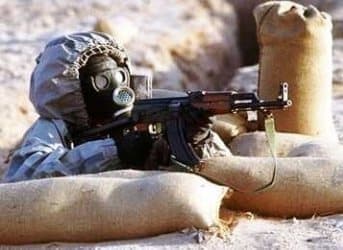The Syrian regime claims that rebels have launched a chemical attack on the strategic northern city of Aleppo, killing 25 people and wounding dozens more, while rebels claim the attack was launched by regime forces.
The SANA news agency—a regime mouthpiece—claimed that the rebels on 19 March had fired poison gas rockets from a district they hold in the city. The agency broadcast footage of the aftermath of the alleged attack, showing the victims being transported to and treated in the hospital.
The Syrian National Coalition rebel formation apparently has no knowledge of an attack, but a spokesman for the rebels’ High Military Council in Aleppo says the government fired a Scud missile containing chemical agents.
No one else seems to have any information about the alleged chemical attack.
As always, the timing is important. Just hours prior to news of the attack, the rebel Syrian National Coalition elected itself a “prime minister” for a new interim government to take control of rebel-held areas in the country, making it clear there would be zero dialogue with the regime. On 19 March, in Istanbul, Ghassan Hitto was elected interim “prime minister”.
There are three possible scenarios here. One is that there was no chemical attack and this is merely well-timed publicity stunt by the regime. The second scenario is that the regime launched a chemical attack on the citizens of Aleppo hoping to demonstrate the lengths the rebels will go to secure power and the danger they pose to the Syrian public. The third is that one of the many diverse factions of rebels was sending a message to the Syrian National Coalition that its new “interim government” will not be accepted by the rebels at large.
Each scenario is plausible, and it will be impossible to obtain 100% confirmation on this playing field.
Iranian press puts the blame definitively on the rebels. “After the insurgents fighting the central government in Syria used chemical weapons for the first time, the spokesman for the Free Syrian Army claimed the government was the perpetrator. But many […] believe this is an attempt by the US and its allies to prepare the ground for a military campaign against Syria,” wrote Iran’s Press TV.
The US government’s version of the story is that the rebels did not launch a chemical attack on Aleppo, and this could only have come from the regime. "We are deeply skeptical of a regime that has lost all credibility and we would also warn the regime against making these kinds of charges as any kind of pretext or cover for its use of chemical weapons,” White House spokesman Jay Carney told reporters.
The third scenario, however, requires some additional examination, regardless of an alleged chemical weapons attack. Syria’s opposition forces hiding out in Turkey--and enjoying the luxury of swanky five-star hotels in Istanbul--while their brethren are doing the dirty work are not necessarily calling the shots here. As the weeks and months pass, they are more clearly being removed from the equation. Their only saving grace is their ability to raise funds and ensure a flow of weapons to the rebels—a flow they attempt to control by funneling it to “right” rebels who will support their eventual leadership.
This has created significant resentment among various rebel factions who are not privy to this logistics largesse.
What rankles both the regime and other Syrian rebel formations is that Ghassan Hitto—the “elected” prime minister of Syria’s rebel-held areas--is a Syrian-born US citizen with foreign backing. He plans to use the Free Syrian Army to support his authority (from Istanbul).
The whole point of this exercise in authority is to take control of the rebels, who have been significantly infiltrated by radical forces from various countries. But Hitto is not welcomed across the board even among the genuine Syrian opposition.
ADVERTISEMENT
During the vote in Istanbul, several high-profile members of the opposition walked out. They saw this as a Western attempt to hijack the “election” and install their favorite. But this is the price to pay for “aid” to the rebel cause.
The message right ahead of the “vote” was a clear one: The US would not oppose Western Europe’s arming of the Syrian opposition if Hitto is elected to head the “interim government”. The UK and France (the latter has the only foreign oil interests in Syria) are excited at the prospects here, and now they have been given the (almost) final blessing to intervene. NATO is exploring a variety of Libya-style military operations to this end.
By. Charles Kennedy of Oilprice.com


















